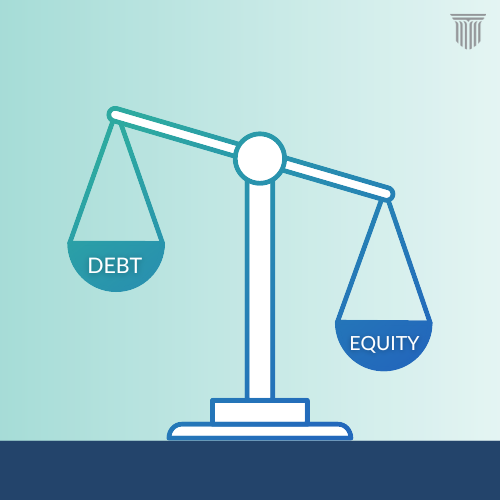When seeking capital for your business, understanding the difference between debt and equity financing can help you weigh the pros and cons and apply for the one that best suits your needs. Accessibility to funding, economic climate, existing capital structure, and business ownership are just some factors that influence the type of financing a business chooses.
We have come up with a list of things to consider when choosing between debt and equity financing so you can make an informed decision.
Debt Financing
Debt financing involves borrowing a fixed amount of money, which is then paid back with interest within a previously agreed-upon time period. As a business takes on more and more debt, the interest rate on repayment also increases. Businesses may be required to put up assets like inventory, real estate, or equipment for collateral as reassurance to the lender. Here are some factors to take into account when considering debt financing:
- Quick turnaround: Debt financing allows you to save time as you receive the money relatively quickly. It is also more flexible because it comes with short-term and long-term options. Short-term financing is used for more immediate purposes like inventory, material and renovation. Long-term financing typically finances machinery, equipment, and ongoing set-up costs.
- Defined terms: The terms and conditions of a debt financing agreement are clearly laid out and mutually agreed upon before the transfer of funds takes place. This ensures that the business knows, before getting into a contract with the lender, the amount it owes as well as how long it has to repay the loan.
- Control of ownership: Perhaps the biggest advantage of debt financing is that the business does not have to give up control or ownership. While the financer does become intimately familiar with your business operations during the application and approval process, they will have no control or share in the overall ownership of your business.
Additionally, if you are thinking of applying for debt financing for your business, self-evaluating how you score on the five Cs of credit can help you predict the outcome of your application:
- Character: What business experience and credit history do you bring to the table? Your track record for repaying debts on time and your credit score help the lender assess the credit risk involved with funding your business.
- Capacity: Does your business have the capacity to repay the loan as per its debt-to-income (DTI) ratio? DTI is calculated by adding total monthly debt payments and dividing it by your business’ gross monthly income.
- Capital: What kind of capital have you put toward an investment into your own business? Or, in other words, how serious are you about your business? The initial capital you invest into your business plays an important role in a lender’s approval process.
- Collateral: What can you pledge to guarantee repayment of the loan? Providing collateral assures the lender that if you default on your payments, the lender can repossess your collateral to reduce loss. Since collateral-backed loans are less risky for lenders to issue, they often have lower interest rates and better terms.
- Conditions: What overall economic factors and specific conditions of your loan impact your creditworthiness? These conditions can include interest rate, amount of principal, purpose for loan, overall state of the economy, and industry trends. If a financer knows the requested financing is going to be used for a specific purpose, they are more likely to approve the loan.
These factors can help you decide whether debt financing is a viable option for financing your business.
Equity Financing
Equity financing involves selling a stake in your company to investors who hope for a share in the future profits of your business. In equity financing, an investor puts money or assets into your business in exchange for a percentage of ownership. Although you are not required to repay the investment or deal with interest rates as in the case of debt financing, you do have to sell a share of your business to the investor who can then vote in company decisions.
Here are some factors to keep in mind when considering equity financing:
- Time: Equity financing takes more time as it involves considerable back-and-forth between business owners and potential investors who negotiate terms of the investment package, including the percentage of share that will be given in exchange for investment. The legalities involved in equity financing also add to its time-consuming nature.
- Rapid growth: If your business is in a high-growth industry, equity financing might just be the option for you. The large capital a company can obtain through equity financing makes rapid growth and upscaling easily achievable.
- Long-term stakes: When deciding whether your business qualifies for equity financing, investors generally look at the bigger picture and analyze the long-term future of the business rather than the immediate collateral or cash flow in the near future. Although you are not tasked with the burden of repaying loans, as a business owner seeking equity financing, you do have to convey your ability to deliver the theoretical future success of your business.
Ultimately, the decision between debt and equity financing, or a combination of both, depends on the nature and size of your business, its financial needs and the current economic conditions. And remember, too, that it is possible to use a combination of debt and equity financing to best suit your specific business requirements.
Still deciding which funding option to go with? Check out our Debt vs. Equity Calculator or reach out to our team of experts at [email protected]!







